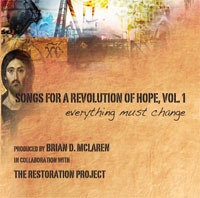
The terms Emerging Church and Emergent Church are used interchangeably by some and used distinctively by others, so let me distinguish between the two if you ever see someone differentiating them.
Emerging refers to the movement to present the gospel of Jesus in new ways. In the U.S. it might be properly called a revival as there was an earlier Emerging Church movement in the Europe (like England). Nonetheless, you might find these people having worship services in coffee shops, outside, or in night clubs at different times to reach a different group of people. Perhaps their services might be so moving that you never get to the sermon and it’s just a complete musical worship service. They may be churches that have a deeper appreciation of the arts and nurture that like praising God through worship-art. No matter the new methods or locations, the message is still the same. An example might be Mark Driscoll’s Mars Hill Church in Seattle (not to be confused with Rob Bell’s Mars Hill in Grand Rapids – VERY different). Mark’s church reaches out to a lot of people like skateboarders, tattoo artists, etc. It’s considered a hip church and Mark dresses accordingly.
The Emergent Church actually deals with people who actually have somewhat different beliefs. These are people who have engaged in a reassessment of Jesus and his words. I would still these people Christian, but some non-Emergent Christians might use terms like heretics or “not Christian” to describe them.
Rather, for me, I love inquiry and questions, and I welcome and embrace anyone willing to grapple with what Jesus meant and means. Like Donald Miller says, I don’t think any of us have our theology together. And as Anne Lammott says everyone thinks they’re right; if they didn’t they wouldn’t believe what they believe.
The problem with criticism of the Emergent Church is that it is not really a church or a denomination. It’s just a bunch of people who might say similar things but are reconsidering Jesus and his words and the gospel and trying to do what they believe he really would have wanted. They do not all say the same things, do the same things. To criticize Emergent Church writers, pastors, doers, you must criticize a specific person and criticize a specific comment or belief. You cannot really paint a broad brush. Many people labeled Emergent do not even know they are Emergent or would not label themselves as such. They just do.

I think it might be fair to talk about one of them, N.T. Wright, an example of his. Traditional Christianity uses the gospels (the books of Matthew, Mark, Luke, and [less so] John from the Bible that tell stores of Jesus’s life) as stories from which you can learn a little theology but to derive the bulk of theology (or all) from the letters of Paul and the epistles (letters from apostles) and Revelations [all the end books of the Bible after the gospels]. A lot of times what N. T. Wright is trying to do is to elevate the place of the gospels. So instead of the gospels being about Jesus, we study the gospel OF Jesus. There is a difference.
Here is a poor example (I have never seen an Emergent person use it, but it illustrates a point). When Jesus was on the cross, he didn’t say “Forgive them because I have paid the price” which is considered theologically correct. Instead he said “Forgive them for they know not what they do.” Is there something to be learned in that at all? That’s the question. Like I said, I haven’t seen an Emergent writer use that or say that means forgiveness comes when there is ignorance on the part of committers of sin.
Another example might be the pastor I told you about, maybe a year ago, who thought that we should only concern ourselves primarily with giving alms and charity within the church and not out. He used Paul’s example (Paul was collecting money to give to the church in Jerusalem which was suffering due to a lack of food). Well, in writing I used examples from where? The gospels, in the life of Jesus, the one who healed, helped, related, conversed with people regardless of whether they were disciples of him or not, yet.
People who have participated in a reassessment of Jesus and his message are Walter Brueggemann, Marcus Borg, Miroslav Volf, Tony Campolo, Shane Claiborne, Jim Wallis, Dominic Crossan, Diana Butler-Bass, N. T. Wright, Steve Chalke, Brian McLaren, Joan Chittister, Richard Rohr, Rene Padilla, Samuel Escobar, Ched Meyer, Mary Kate Morse, and many more. I have spoken about many of these guys, and I am not calling them all Emergent, but they are interesting people to read. Let’s look at the difference between the Emergent view and the traditional view. From this point, I will use emerging and emergent interchangeably to refer to the Emergent.
2 comments:
You have some good insights. Particularly in how emergents view the gospels. We are concerned with 'the gospel of the kingdom' moreso than the restricted gospel of 'the romans road.' (this is not to suggest that i am not in favor of personal salvation...because i know what it is to be saved from personal sin!!!) What i am saying is that it is important that we read Paul through the lens of Jesus rather than read Jesus after we figure out our pauline theology. NT Wright is by far my favorite scholar, but i also want to say that he is in no way emergent when it comes to praxis.
Good points, yourself. You sound like an emergent thinker and practicer. Good point about N.T. Wright and praxis. I need to read more of him. Interesting point is that Paul would actually stress orthodoxy for the very reason that he felt orthodoxy affects orthopraxy. So that comment is interesting.
Post a Comment